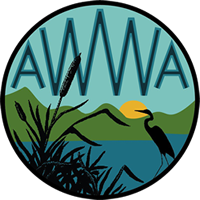It is hard to believe that just 8 short weeks ago we were kicking off our 8th Youth Conservation Corps (YCC) season. We had some veteran crew leaders and one returning crew member, but the rest were looking at their first experience with AWWA…
In that time a lot happens and the changes are amazing. Not only do these six teenagers and two young adult crew leaders go out everyday and transform eroded water front properties into beautiful landscaped areas, but they grow as individuals. Each member of the crew learns new skills, grows stronger with every wheel barrow load, and experiences adversity, both physically and mentally.
This year, our crew set out on June 24th with a lot on their plates. We had a lot of projects lined up and more coming in everyday in the earlier part of the season. Although it took some time (as it always does) to bring everyone up to speed and mesh together as a team, within a few weeks the crew was moving through projects at a great rate.
The pushed through the heat of the middle of summer and tackled every task we set before them with enthusiasm and positive attitudes. As the YCC season neared an end, the crew was working on all cylinders and having a great time doing it. It was this attitude that allowed us to complete a record 25 projects across 7 lakes in Wakefield, NH and Acton, ME. On these sites they installed 101 Best Management Practices (BMPs) to reduce the flow of polluted runoff to the lakes and infiltrate that runoff into the ground where it can be cleaned by the soils. These BMPs will stop an estimated 57.2 tons of sediment and 48 pounds of phosphorus from entering the lakes annually!
As the Program Manager and Technical Director, I could not be more pleased with the effort of these 8 individuals and the result of their hard work. Below are a few pictures of the work they did this summer. Stay tuned for our annual report and more of our work as we move from this great summer to fall!

 Great East Lake – Rip rap shoreline, erosion control mulch, rock terraces, native vegetation, and infiltration trench.
Great East Lake – Rip rap shoreline, erosion control mulch, rock terraces, native vegetation, and infiltration trench.

 Lovell Lake – Waterbars, dripline trench, and erosion control mulch
Lovell Lake – Waterbars, dripline trench, and erosion control mulch

 Great East Lake – Infiltration Steps
Great East Lake – Infiltration Steps

 Balch Lake – Infiltration Steps, Erosion Control Mulch, and Native Vegetation
Balch Lake – Infiltration Steps, Erosion Control Mulch, and Native Vegetation




